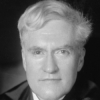Benjamin Cardozo

Benjamin Cardozo
Benjamin Nathan Cardozowas an American jurist who served on the New York Court of Appeals and later as an Associate Justice of the Supreme Court. Cardozo is remembered for his significant influence on the development of American common law in the 20th century, in addition to his philosophy and vivid prose style. Cardozo served on the Supreme Court six years, from 1932 until his death in 1938. Many of his landmark decisions were delivered during his eighteen-year tenure on the...
NationalityAmerican
ProfessionSupreme Court Justice
Date of Birth24 May 1870
CountryUnited States of America
With traps and obstacles and hazards confronting us on every hand, only blindness or indifference will fail to turn in all humility, for guidance or for warning, to the study of examples.
Consequences cannot alter statues, but may help to fix their meaning.
Due process is a growth too sturdy to succumb to the infection of the least ingredient of error.
Membership in the bar is a privilege burdened with conditions.
The prophet and the martyr do not see the hooting throng. Their eyes are fixed on the eternities.
The constant assumption runs throughout the law that the natural and spontaneous evolutions of habit fix the limits of right and wrong.
The repetition of a catchword can hold analysis in fetters for fifty years or more.
It is for ordinary minds, not for psychoanalysts, that our rules of evidence are framed. They have their source very often in considerations of administrative convenience, or practical expediency, and not in rules of logic.
Expediency may tip the scales when arguments are nicely balanced.
Inaction without more is not tantamount to choice.
Danger invites rescue. ... The wrongdoer may not have foreseen the coming of a deliverer. He is accountable as if he had.
Not honesty alone, but the punctilio of an honor the most sensitive, is then the standard of behavior.
The difference is no less real because it is of degree.
The great generalities of the constitution have a content and a significance that vary from age to age.